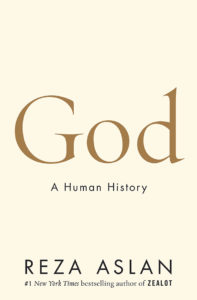The Wisdom of Reza Aslan’s God: A Human History

In his new book, God: A Human History, Reza Aslan reviews the history of and scholarly literature on humans’ conceptions of the divine. Simultaneously reflecting on his own lifelong, winding spiritual journey, he concludes, “it is we who have fashioned God in our image, not the other way around. And in that truth lies the key to a more mature, more peaceful, more primal form of spirituality.”
He appeals to his readers to “develop a more pantheistic view of God,” which he defines as “God is all” or “all is God.”
Synthesizing history, anthropology, psychology, neuroscience, evolutionary theory, and other disciplines, Aslan explains that we are “susceptible to perceiving agency in natural phenomena” and “inherently biased toward ‘humanizing’ whatever phenomena we encounter.”
Highlighting examples from religions including Zoroastrianism, Judaism, Christianity, and Islam, he describes the concept of “politicomorphism,” defined as “the divination of earthy politics.”
Aslan assesses, for example, that the “remarkably democratic nature of early Mesopotamian civilization was…perfectly reflected in early Mesopotamian renderings of the celestial order,” but that in the middle of the third millennium BCE, “despotic powers emerged across Mesopotamia. Across the region, overpopulation and lack of resources led to a near-permanent state of war.” Not coincidentally, “The new political reality would be reflected in the Mesopotamian myths written after this period.”
Aslan observes variations on this theme within the Abrahamic religions (Judaism, Christianity, and Islam): “As Clement I (d. 101 CE), the first bishop of Rome and thus the first pope, warned, anyone who failed to ‘bow the neck’ to his authority…was guilty of rebelling against God and should be put to death.”
The Emperor Constantine later employed Christianity to motivate his military forces and unify the populations under his authority.
Aslan describes religion not only as a unifying force but also as a disruptive one in cases in which it clashes with the established political and economic order, such as in seventh-century Arabia at the advent of Islam.
This provides at least a partial explanation for the geopolitical rivalries of the modern Middle East, suggesting that despite humanity’s technological advancement, other aspects of our existence have changed depressingly little. This technological advancement, moreover, is double-edged: we have developed the ability to communicate with each other instantaneously across national borders via Facebook, Twitter, and Google Translate, yet our destructive impulses and modern weapons make us capable of collective self-annihilation within a matter of minutes.
This is especially alarming in a world in which it remains true, for example, that “nearly every school of law in Islam insists that God’s words in the Quran must be taken literally.” This fundamentalist worldview is prevalent not only in the Muslim world, but also in a resurgent Christian nationalist America and religious Zionist Israel.
One might infer from our highly unstable current reality that we should adopt a more humanistic worldview as a matter of survival. This would not prevent or resolve violent conflicts, but it would, importantly, reduce the likelihood that already destructive wars over resources would not devolve into existential conflicts between nuclear-armed polities with fundamentally irreconcilable belief constructs.
A global adoption of a spiritual humanism, or “pantheism,” using Aslan’s favored term, would require us to make the conscious decision to evolve beyond our cognitive and motivated biases. Such a shift would, of course, be vehemently opposed by political and religious leaders whose power and wealth derive from perpetuation of the status quo.
As he relates in the history of Israel’s “first successful experiment with monotheism,” such an evolution might also come about as the result of a “profound disruption” to preexisting belief systems. The elements of such a disruption are on the verge of combustion in the Middle East now, where three nuclear states—the US, Russia, and Israel—warily maneuver around each other in Syria. Iran, now one year away from becoming a nuclear state, is preparing a military campaign to annihilate the country its leaders describe as “the Little Satan.” This conflict could have reverberating effects throughout the world, which remains precariously dependent on the energy resources of that region. Unfortunately the influence of religious nationalism within the US, Iran, and Israel is making the disruptive path the more likely one.
However the future unfolds, Reza Aslan provides us with the intellectual and philosophical architecture to build a better world.
